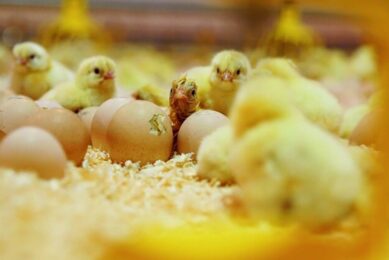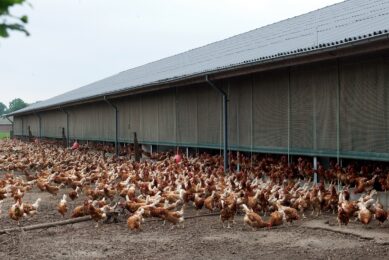Glycoprotein D protects against highly virulent ILTV

Infectious laryngotracheitis (ILT) is a highly contagious acute respiratory disease of chickens caused by infectious laryngotracheitis virus (ILTV).
Currently, modified live ILTV vaccines are used to control ILT infections. However, the live ILTV vaccines can revert to virulence after bird-to-bird passage and are capable of establishing latent infections, suggesting the need to develop safer vaccines against ILT.
In a field test, three major ILTV surface glycoproteins were evaluated, namely, gB, gC, and gD in protection and immunity against ILTV infection in chickens. Using reverse genetics approach, three recombinant Newcastle disease viruses (rNDVs) designated rNDV gB, rNDV gC, and rNDV gD were generated, each expressing gB, gC, and gD, respectively, of ILTV.
Chickens received two immunisations with rNDVs alone (gB, gC, and gD) or in combination (gB + gC, gB + gD, gC + gD, and gB + gC + gD). Immunisation with rNDV gD induced detectable levels of neutralizing antibodies with the magnitude of response greater than the rest of the experimental groups including those vaccinated with commercially available vaccines.
The birds immunised with rNDV gD showed complete protection against virulent ILTV challenge. The birds immunised with rNDV gC alone or multivalent vaccines consisting of combination of rNDVs displayed partial protection with minimal disease and reduced replication of challenge virus in trachea. Immunisation with rNDV gB neither reduced the severity of the disease nor the replication of challenge virus in trachea.
The superior protective efficacy of rNDV gD vaccine compared to rNDV gB or rNDV gC vaccine was attributed to the higher levels of envelope incorporation and infected cell surface expression of gD than gB or gC. Our results suggest that rNDV expressing gD is a safe and effective bivalent vaccine against NDV and ILTV.
Source: Vaccine 2014. M. Kanabagatte Basavarajappa and Co-workers
Virginia-Maryland Regional College of Veterinary Medicine, University of Maryland, College Park, MD USA
Join 31,000+ subscribers
Subscribe to our newsletter to stay updated about all the need-to-know content in the poultry sector, three times a week. Beheer
Beheer








 WP Admin
WP Admin  Bewerk bericht
Bewerk bericht